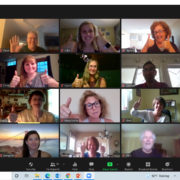Retirees Provide a Vital Voice for NH’s Abused and Neglected Children
 After Seacoast New Hampshire resident Dean Plager retired, he enjoyed spending more time sailing, but he also felt a need to give back to society. He read an article about a local woman who was advocating for abused and neglected children as a volunteer with CASA of NH. “It hit home for me because I had been looking for something to do that really makes a difference. This was it,” Dean says.
After Seacoast New Hampshire resident Dean Plager retired, he enjoyed spending more time sailing, but he also felt a need to give back to society. He read an article about a local woman who was advocating for abused and neglected children as a volunteer with CASA of NH. “It hit home for me because I had been looking for something to do that really makes a difference. This was it,” Dean says.
Court Appointed Special Advocates of New Hampshire – or CASA of NH – recruits, trains and supervises volunteers to serve as advocates for abused and neglected children in the New Hampshire court system. Volunteers spend time getting to know a victimized child and the important adults in that child’s life so they may make qualified, unbiased recommendations to a judge deciding a child’s future. Since CASA of NH was founded in 1989, its volunteers have helped more than 10,000 children grow up in safe, permanent homes.
More than 55 percent of CASA of NH’s 600 volunteers last year were over 60 and almost 50 percent were retired or working part-time. According to Marcia Sink, founder and President/CEO of CASA, women and men of retirement age play a key role in the organization’s goal to provide a CASA volunteer advocate to every abused or neglected child who needs one.
“We are expecting a surge in cases of abuse and neglect after the COVID pandemic passes and we need more volunteers now. Retired folks or people with flexible schedules are in a position to step up quickly, plus we find that our older volunteers have tremendous abilities that they still want to use during retirement. It is a good combination,” she says.
CASA volunteer advocate Darcy Horgan calls her work for CASA a “win/win,” commenting that “it engages my work ethic but has real meaning. At this stage of life, what a bonus it is to do valuable work that is fulfilling!”
Monadnock-area resident Patience Stoddard was a little bored in her second year of retirement. She attended a 40-hour training session to become a CASA volunteer advocate and found the training “exceptional.” She also discovered kindred spirits in her fellow classmates. “It makes you realize that there are a lot of good people out there. It keeps your faith in humanity,” she says.
As with other aspects of life, the COVID pandemic has altered CASA volunteer work. Training has moved online and advocates meet with children in safely distanced visits or, if the child is old enough, through virtual means. Some courts convene through telephone and web conferences while others offer socially distanced in-person meetings.
Steve and Betsy Coes were deep into training to become CASA volunteer advocates when the COVID pandemic hit. They completed their training online and received their first cases in Spring 2020. Steve says that he has been able to check on his one-year-old CASA child and do the work despite COVID. “Every time a new wrinkle arises, it is an education. Most of all, my CASA work is an education about what the world is like out there. You see how people get in situations and you start to understand motivations,” he says.
Want to learn more? Read our FAQs about volunteering or join us for a live, virtual information session:





